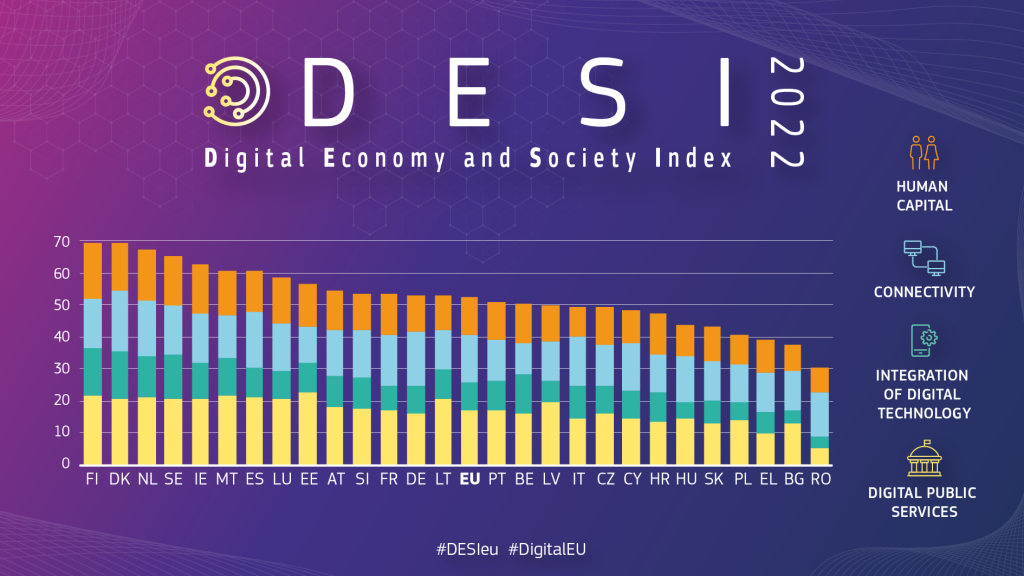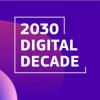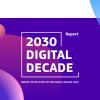The Digital Economy and Society Index (DESI)
The Digital Economy and Society Index (DESI) is a composite index that summarises relevant indicators on Europe’s digital performance and tracks the evolution of EU Member States, across five main dimensions: Connectivity, Human Capital, Use of Internet, Integration of Digital Technology, and Digital Public Services.
From 2014 to 2022, the Digital Economy and Society Index (DESI) summarised indicators on Europe’s digital performance and tracked the progress of EU countries. As of 2023, and in line with the Digital Decade Policy Programme 2030, DESI is now integrated into the State of the Digital Decade report and used to monitor progress towards the digital targets.
DESI's Human Capital dimension focuses specifically on skills, employment and trends in the labour market and in education. It offers comparative data on the way European use the internet and digital devices (basic digital skills) and activities involving more advanced skills in the area of information and communication technology (ICT). DESI also tracks the number of graduates in the field, % of employees in the ICT sector, and others.

The index offers data on the digitalisation and competitiveness of each Member State and helps policymakers, public officials, governments and regional administrations and municipalities to adapt areas of priority and invest in them on an evidence-based approach. It can also assist authorities and lawmakers in developing solutions and measures, which reflect the current trends in the employment market and meet the demands of the future.
As the index offers information on a variety of trends related to the labour market and overall business environment, it could be useful to companies and organisations looking to expand their operations into other countries and delve into certain market trends. Finally, DESI can be of interest to citizens who want to compare the extent to which their Member State of origin has developed and discover aggregated data on performance, digitalisation, skills level, and others.
DESI 2023 (First Report on the state of the Digital Decade)
The DESI 2023 dashboard is a pivotal tool in monitoring Europe's progress towards a digitally empowered future. By providing a comprehensive overview of key indicators and enabling comparative analysis, it equips stakeholders with the insights needed to drive transformative change. Whether focusing on specific indicators, comparing countries' trajectories, or examining correlations, this resource offers a wealth of information at your fingertips.
The 2023 report serves as a rallying cry to Member States, urging collective action to bridge existing investment gaps, expedite digital transformation, and meet the objectives outlined in the Digital Decade Policy Programme. The programme, enacted in January 2023, establishes a collaborative governance framework between the EU and national authorities.
DESI 2022
The DESI 2022 reports were released on 28 July 2022. They are mainly based on 2021 data and track the progress made in EU Member States in digital. While EU Member States have made progress in their digitalisation efforts during the COVID-19 pandemic, they are still struggling to address the gaps in digital skills, turn SMEs into digital businesses, and put out cutting-edge 5G networks.
The data of the 2022 DESI report show that only 54% of Europeans aged between 16-74 have at least basic digital skills. Furthermore, the EU's 9 million ICT specialists also fall well short of the EU aim of 20 million specialists by 2030 and are not enough to address the skills shortages that businesses, SMEs and organisations are now experiencing, despite the fact that 500.000 ICT specialists entered the labour market between 2020 and 2021. The 2022 results demonstrate that while the majority of Member States are making progress in their digital transformation, essential digital technologies like Artificial Intelligence (AI) and Big Data are still not widely used by enterprises.
Nevertheless, there is an overall positive convergence trend: the EU continue to improve its level of digitalisation, and the Member States that began at lower levels are gradually catching up by expanding more quickly. In particular, Italy, Poland, and Greece significantly raised their DESI ratings over the previous five years by making consistent investments and sharpening their political focus on digital technology, which were also supported by European funding.
DESI 2021
The previous version of DESI was published on 12 November 2021 by the European Commission. The DESI 2021 report contains important updates reflecting the major changes occurred due to the COVID-19 pandemic. The new reports are mainly based on 2020 data, with the aim to provide some insight into key developments of the state of digital economy and society after the first year of the pandemic in Europe.
This year's edition also reflects the two major new policy initiatives launched to impact digital transformation in the EU in the coming years: Recovery and Resilience Facility (RRF) and the Digital Decade Compass, with specific information on the new measures to boost digital transformation adopted by each EU member state. In particular, The DESI country reports incorporate a summary overview of the digital investments and reforms in the Recovery and Resilience Plans for the 22 plans that have already been adopted by the Council.
Digital skills resource details
DESI's methodology is described in the thematic chapters, accompanying each dimension and related indicators.





